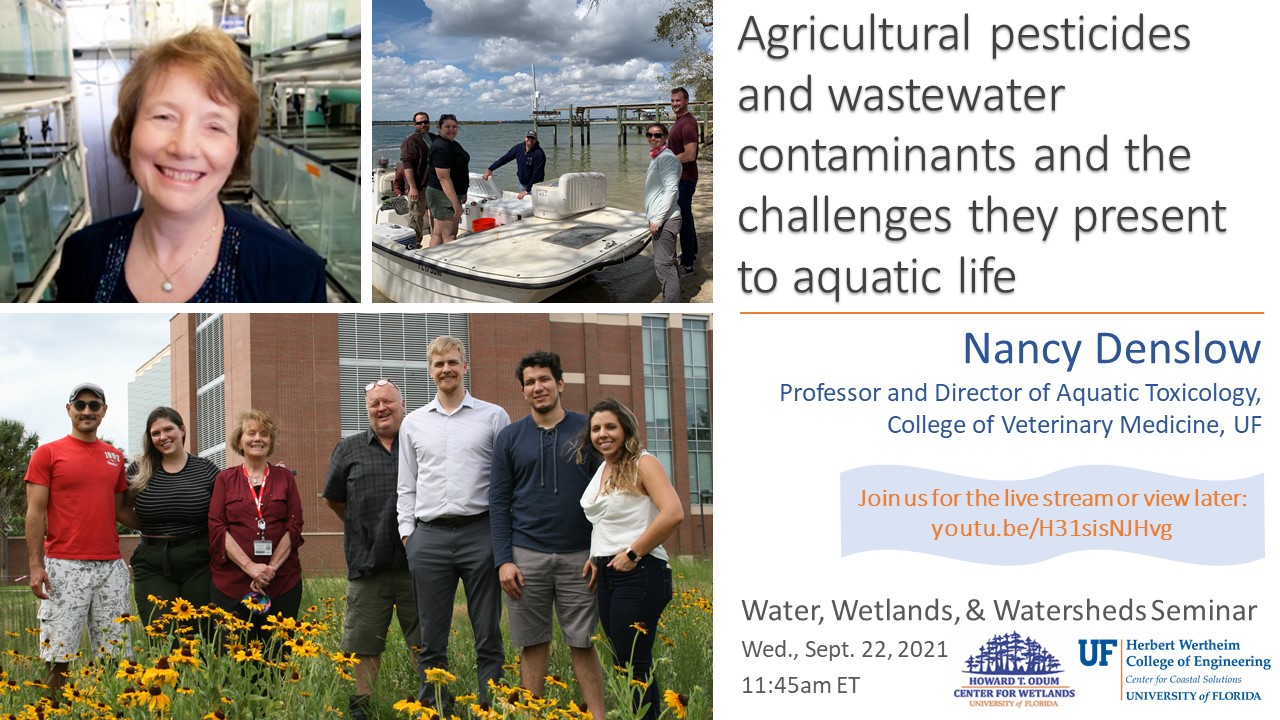September 22, 2021

Agricultural pesticides and wastewater contaminants & the challenges they present to aquatic life
Nancy Denslow, Professor And Director Of Aquatic Toxicology, College of Veterinary Medicine, UF
Join us for the live stream Sept 22, 11:45am EST: https://youtu.be/H31sisNJHvg
(Please visit our youtube channel main page for the stream if there are any issues with the direct link.)
ABSTRACT
Pesticides are heavily used in the agricultural sector to improve crop yields but enter aquatic systems through run off or because they are applied directly to control invasive species. In Florida, legacy organochlorine pesticides were once standard agricultural practice, but even though they were outlawed over 50 years ago, they persist in sediments, water and biota, due to their hydrophobicity. These contaminants have played havoc with aquatic species, behaving as endocrine disruptors and interfering with fish reproduction and immune systems. Current pesticides, such as those based on glyphosate (Roundup), which are quite polar and thus not persistent, are used at extremely high volumes today for GMOs and a variety of other agricultural purposes. In Florida, glyphosate is used to prepare farms for crops, to keep weeds down in between fruit trees, as a sweetener for cane sugar and to remove invasive plants, among other uses. While glyphosate is supposed to be specific for a pathway that only exists in plants, it appears to have non-target effects in vertebrates and mammals, such as fish and marine mammals. Several case studies will be presented that illustrate how molecular endpoints have augmented the understanding we have about how agricultural chemicals may produce adversity on survival, development, growth, reproduction and immune suppression in aquatic organisms.
Bio
Nancy Denslow is a Professor and Director Of Aquatic Toxicology in the Department of Physiological Sciences and in the Center for Environmental and Human Toxicology in the College of Veterinary Medicine at the University of Florida. She received her Ph.D. from the University of Florida in Biochemistry and Molecular Biology. Nancy has pioneered the use of molecular technologies for environmental toxicology especially focusing on high throughput in vitro assays, biomarker development and toxicogenomics approaches for evaluating contaminants of emerging concern. She has specialized in assessing the effects of organochlorine pesticides and endocrine disruptors that are found at relatively high levels in the environment. Nancy has over 250 peer-reviewed publications. She has received several awards for her research including the Founders Award from the Society of Environmental Toxicology and Chemistry. In addition to this society, she is also a member of the Society of Toxicology, and the Association of Biomolecular Research Facilities, a society devoted to the “OMICS” technologies. Nancy’s research has received funding from EPA, NSF, USGS and NIH.
POSTCARD
